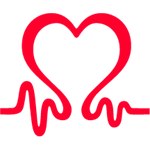With many of our patients managing a heart condition, our charity partner the British Heart Foundation has written a guide on medicines that can be prescribed by your GP or consultant to help keep your symptoms under control, and prevent or treat a heart condition.
There are several types of medication for heart conditions including:
- ACE inhibitors (angiotensin-converting enzyme inhibitors)
- Angiotensin-II antagonists (also called ARBs)
- ARNi (angiotensin-II receptor-neprilysin inhibitor)
- Antiarrhythmic medicines
- Anticoagulant medicines
- Antiplatelet medicines
- Beta-blockers
- Calcium channel blockers
- Cholesterol-lowering medicines (lipid-lowering medicines) such as statins
- Digoxin
- Diuretics
- Nitrates
You may also be on more than one type of medication depending on your condition.
Understanding your heart medication
It’s important to know what you’re taking, why you are taking it, and how it will affect you. When you’re given a new prescription, speak to your doctor about:
- the medication prescribed for you and its potential benefits and risks
- how to take it safely
- possible side effects and what to do if you notice any
- taking other kinds of medicine at the same time, including any over-the-counter medicines or supplements.
Your pharmacist can help with these questions too. You can find more detailed information about your medication on the emc website.
Will my medicine cause side effects?
Some medicines may cause side effects, but often these are temporary and disappear after a short time. Not everyone experiences side effects and you may have none at all.
If you think you’re experiencing side effects it’s still really important to keep taking your medication, but you should contact your GP or consultant. They can discuss the side effects with you and may be able to adjust the dosage or change you to a different medication to reduce any issues you’re experiencing.
Continue to take your prescribed medication even if you feel better, as your underlying condition may get worse if you stop taking it.
Tip: The Yellow Card Scheme collects information from health professionals and medicine users on suspected side effects. You can register with the scheme to report any side effects you experience.
How are heart medicines taken?
Heart medicines come in many shapes and sizes. The most common are:
- Tablets or capsules – These need to be swallowed with or possibly dissolved in water. Sometimes you have to keep the tablet under your tongue until it dissolves. Check the medicine leaflet for more details.
- Aerosol spray – You spray the medicine under your tongue.
- Self-adhesive patch – A patch containing your medicine is placed on your skin and the medicine is absorbed over a period of time.
You may find that different manufacturers use different names and packaging for the same medicines. Always check with your pharmacist if you have questions about this.
When will I need to take my medication?
Most medications need to be taken regularly. Some will need to be taken when you experience a symptom, such as angina. You should always follow your doctor’s instructions.
If you’ve missed a dose, take it as soon as you remember. If it is nearly time for your next dose, skip the one you missed and take the next dose at its scheduled time. Never take a double dose. The medicine leaflet may give more information about missed doses.
How should I store my medication?
- Store your medicine in a cool dry place, like your bedside cabinet.
- Don’t leave your medicine on a windowsill in the sunlight or keep it in your car.
- Always keep your medicine out of the sight and reach of children and pets.
- Where possible, you should keep your medicine in its original packaging to protect it and help you keep track of how much you have taken.
Don’t take medicines that have changed in colour, consistency, or have developed an odour. If you have any old or leftover medicines, return them to your pharmacist who will dispose of them safely.
What else do I need to know?
Tip: Never share your medicine with other people or take medicine that’s not yours. Even if they have the same condition as you this could cause harm.
Salt and medicine
Some medicines contain sodium, which is found in salt. Having a large amount of sodium in your diet can increase your blood pressure, putting added strain on your heart and can lead to cardiovascular disease.
For those taking a regular dose of 75mg dispersible aspirin, the amount of sodium is extremely small so the benefits far outweigh any risk. If you’re concerned about the levels of sodium in your medications, ask your pharmacist for guidance.
Over-the-counter medication, herbal medicines and supplements
Check with your doctor before taking any over-the-counter medicines, herbal medicines or supplements. For example, St John’s Wort, a popular herbal anti-depressant medicine, can interact with a number of medicines prescribed for heart conditions and alter their effectiveness.
